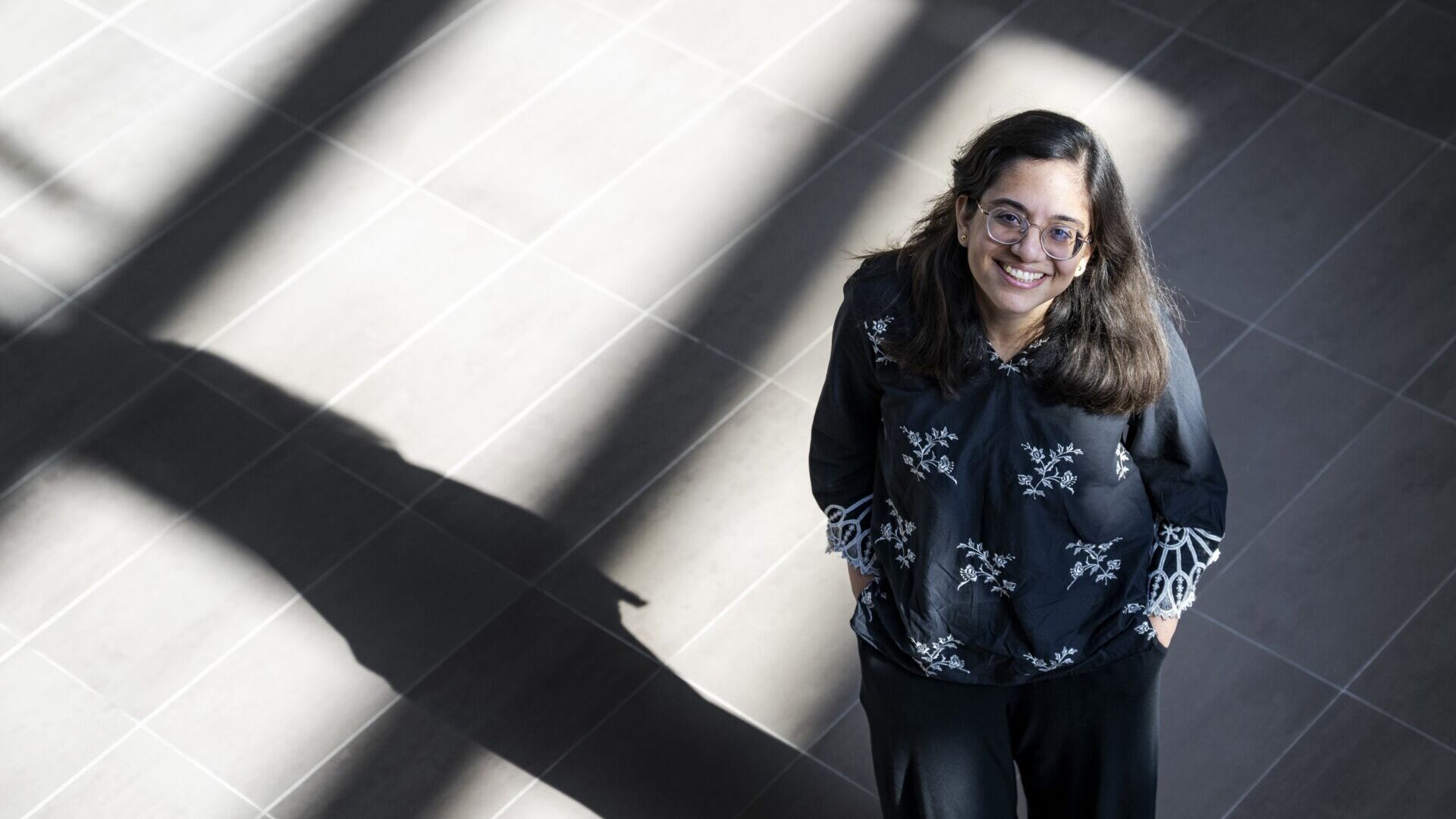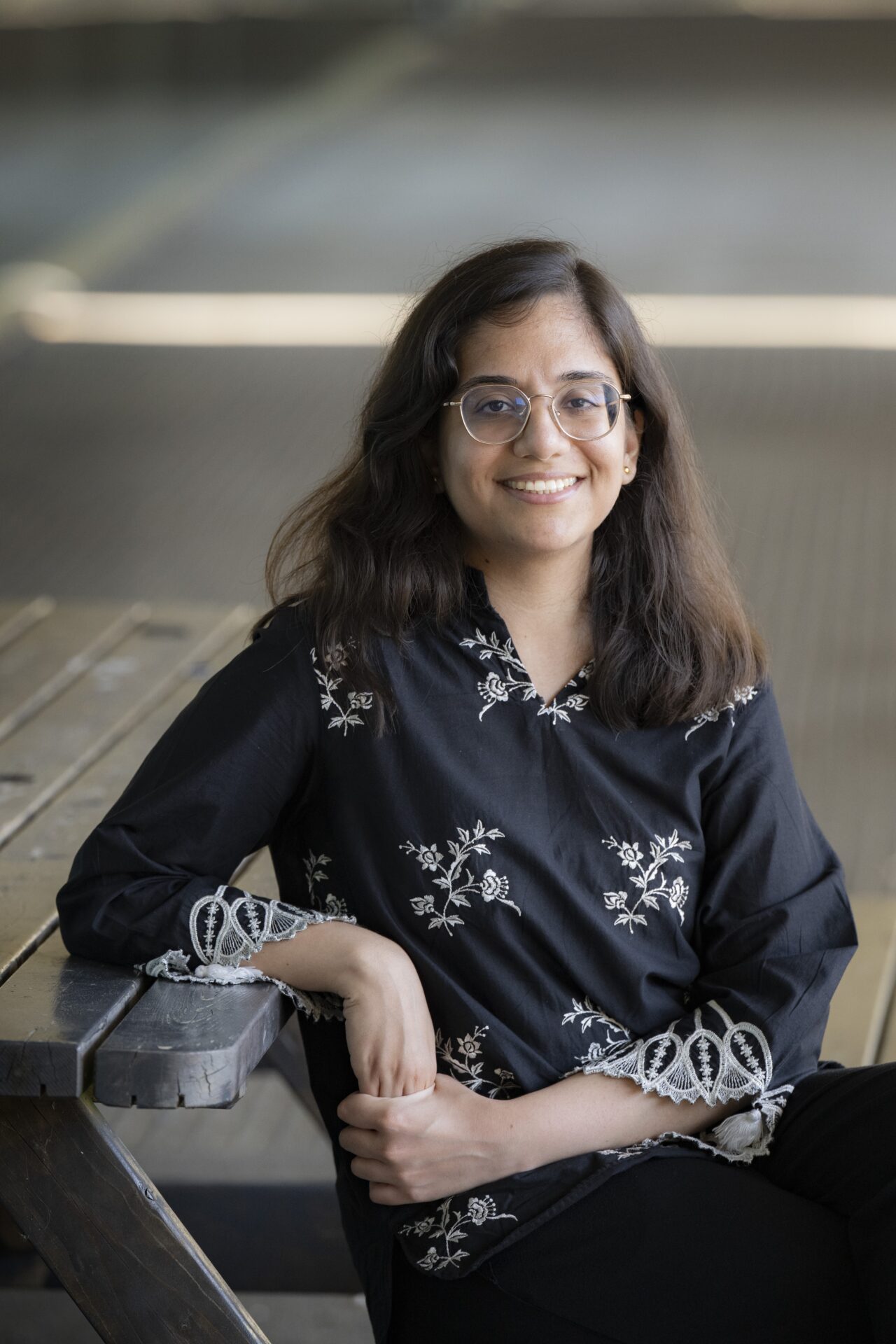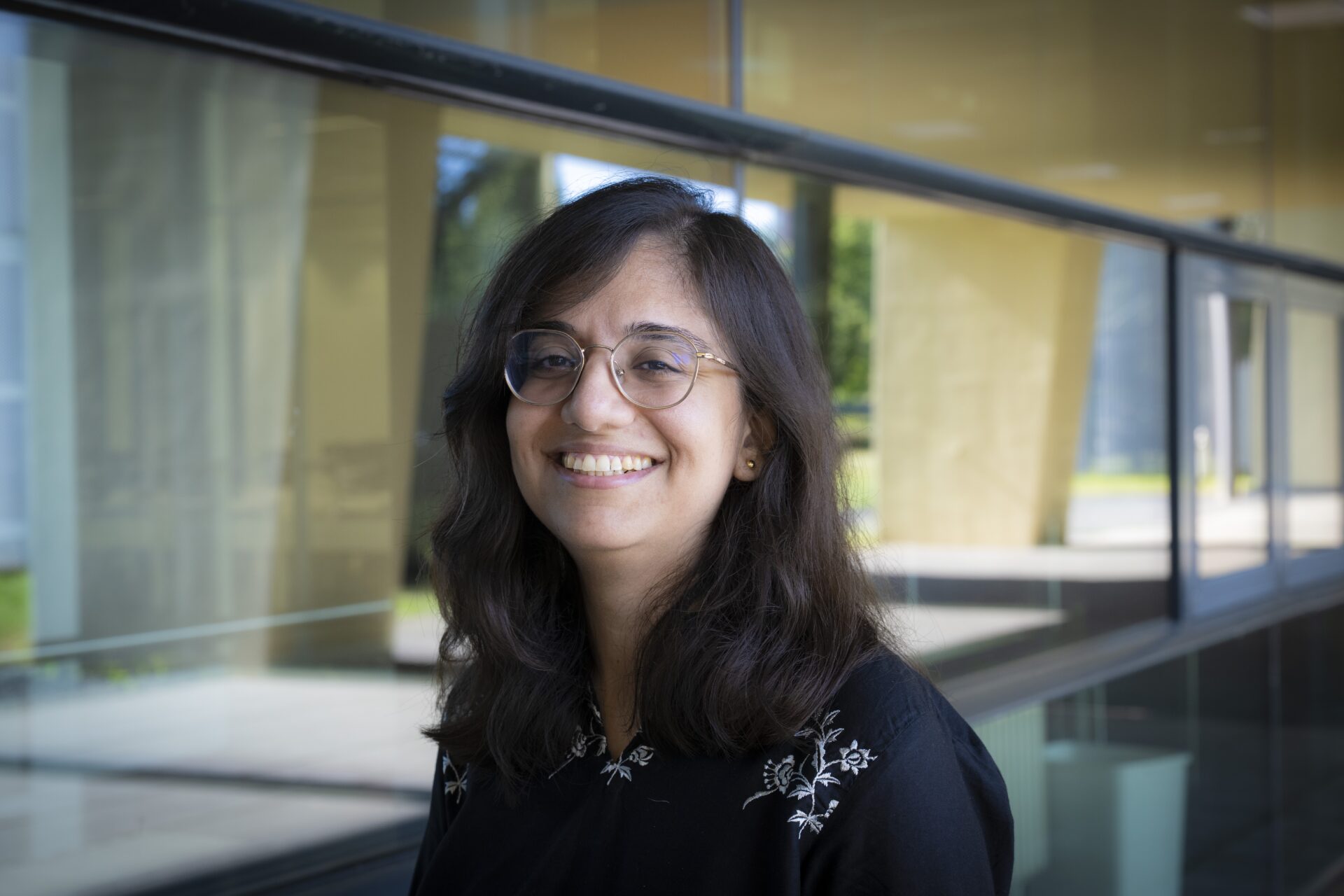‘Do you know what failure is? Believing that there is nothing you can do’
-
 Foto: Bert Beelen
Foto: Bert Beelen
SUMMER INTERVIEW - Bareerah Hafeez Hoorani's teenage years were marked by the ‘war on terror’. Her religion, Islam, was suddenly associated with terror. ‘My identity was hijacked.’ The Assistant Professor of Methods shares how she regained her identity, what she learned from girls in an impoverished community of Pakistan, and why it is so important to be idealistic.
A citywalk with homeless and formerly homeless people. That was what Management students were invited to in 2023 as part of a special course.
The guides of ‘Vagebond City Walk’ shared with the students what it is like to survive on the streets, what it feels like not to belong anywhere, but also what they draw hope and resilience from. Assistant Professor Bareerah Hafeez Hoorani had herself joined the walk shortly after moving to Nijmegen. She says she learned a lot from it. She also felt more connected to the community afterwards.
She did not want to deprive her students of that experience. For the course Qualitative Research Methods, she developed a field activity, which ultimately led to nearly seven hundred students following her example. Hoorani: ‘To really understand a problem, you have to experience it from the inside.’
Self-reflection
The students’ reactions varied. Some thought the homeless people were responsible for their situation. Others felt a lot of empathy and wanted to help straight away. A third group felt uncomfortable, as if it was all too far removed from their own reality. ‘It pushed them to self-reflection: why am I experiencing discomfort? They had to look for the root of the problem in their own thinking.’
The course is representative of Hoorani’s scientific attitude, but also of her philosophy of life, both of which were shaped by her teenage years in Pakistan, the 9/11 attacks and the ensuing war on terror, as well as her struggle with faith. Since 2021, she has been Assistant Professor of Methods at the Nijmegen School of Management, where she develops qualitative research methods that better capture the complexity of social issues such as homelessness, technological crisis, poverty or the nitrogen problem (see box).
Natural phenomena
Her parents taught her from an early age to reflect and think critically, Hoorani tells us from her home in Arnhem. Via video, due to an NS strike. Behind her is an electric piano that she plays when she feels down, she says. She likes to play pieces she composed herself years ago. ‘It improves my mood.’
Hoorani was born in 1989 in Geneva, Switzerland. Her Pakistani father is a particle physicist. Her mother is a modern, free-spirited woman. She may wear traditional Pakistani attire, but in Geneva she worked full-time as a software engineer, a male-dominated sector. Very open-minded, is how Hoorani characterises her mother.
‘My parents taught me to think critically’
At the dinner table at their home, conversation often centred on big life questions and natural phenomena, often initiated by her father who, as a physicist, was working on the Big Bang theory and the creation of the universe. ‘My parents taught me to think critically. I was never allowed to take anything for granted. That attitude eventually drove me into research, I think.’
War on terror
Moving back from Switzerland to Pakistan at the age of 10 changed her life drastically. Together with her family, she ended up in Karachi, the country’s largest city, located in the south on the Arabian Sea. She had to get used to a new school and make new friends again, but the move was not a culture shock. ‘Karachi is a vibrant city and a melting pot of many different ethnicities.’
Pakistan is a country with many different cultures and religions, Hoorani explains. Most people are Muslim, but there are also Hindus and Christians, as well as accepted religious minorities like the Parsis. Pakistan is also linguistically diverse. In addition to Urdu, the country has over 70 languages. Most Pakistanis speak at least two or three languages. English is the official language, prevalent in government, education and various media. That is clearly apparent in Hoorani’s flawless English. She is now studying for her A1 Dutch exam, she later tells us. Which is not easy.
Shortly after the family relocates, two Boeings hijacked by terror organisation al-Qaeda fly into the twin towers of New York’s World Trade Center. ‘Of course, if my parents could have foreseen that disaster, they would never have gone back. After 9/11, life in Pakistan became very difficult.’
Soon after the attacks, US President George W. Bush declares his war on terror. Pakistan becomes a key ally in the war, a development that marks Hoorani’s teenage years. Bush is putting pressure on the radical Islamic movement Taliban – whose members were incidentally trained and armed by the United States during the 80s. The Taliban were in power in neighbouring Afghanistan, harbouring al-Qaida and its leader Osama bin Laden, the mastermind behind the attacks. The security situation changes radically in Pakistan. The country is rocked by numerous suicide bombings.
Terrorist attacks in your own country. Weren’t you scared?
Hoorani laughs a little uncomfortably. ‘No, I don’t think so. There were attacks everywhere, every week, on buses, in schools, even in mosques. Horrible incidents. Looking back on it now, I think: how was I not afraid? I don’t know. Life was also going on as usual. Maybe as a teenager I was more concerned with how my hair and make-up looked?’
Still, it could not have been an easy time.
‘No, definitely not. I struggled so much with my identity. I felt that it had been hijacked. With the attacks and the war on terror, there was tremendous negativity around Islam. Doesn’t it bother you that your religion spreads terrorism? People were bombarding me with these questions and I also started asking myself: do I want to identify with that religion?’
‘In the end, over fifty thousand Pakistani civilians lost their lives. Hundreds of thousands fled. But if the war was about Islam, why were they attacking mosques, I wondered.’
Where did those existential questions lead you?
‘In the first years after 9/11, I did not want to be associated with Islam. That also had to do with my critical thinking. We could not know whether there was a God; that was my conviction at the time.’
Despite years of war, Hoorani’s life in Pakistan went on. After secondary school, she decided to pursue a bachelor’s degree in Business Administration in Karachi. After completing that study programme, she joined Teach For Pakistan (NGO), and started teaching English and Science to about eighty girls from an impoverished community, in a suburb of Karachi (Shirin Jinnah Colony). She had long wanted to do development work and she thought she would teach the girls a lot. But things turned out very differently.
What happened?
‘The school was part of a very conservative community. I am personally not conservative, but when you become part of such a community, you see that most people try to navigate through life as best they can, whatever philosophy of life they adhere to. I also thought I was going to teach the girls something, but the opposite happened. They taught me so much about life.’
‘The school had no water and no electricity. The girls often brought two bottles of water, one with drinking water and one to flush the toilet with. There were insects crawling everywhere. They often had to make do with just one meal a day; most did not eat breakfast before they came to school. Despite having almost nothing, they were so hopeful and positive in life. They were also very intelligent, much smarter than me. Their school performance improved rapidly.’
‘I feel that qualitative research brings me closer to real life’
‘In that poor community, I experienced first-hand that ‘bad’ statistics like poverty or low literacy sometimes hide very beautiful things. And that with the right learning method and a stimulating environment, every child has the capacity to achieve good school results. That experience ultimately drove me into studying qualitative research methods. Personally, I feel that qualitative research brings me closer to real life, closer to the human experience.’
Hoorani returned to Geneva at age 24, this time for a master’s degree in economics at the Université de Genève where she specialized in econometrics, followed by a PhD defence, summa cum laude, in qualitative research at the Università della Svizzera Italiana, Switzerland. In 2021, she transferred to Radboud University where she proceeded with her research on new qualitative methods. ‘The job description read like a copy of my CV.’
Nijmegen is not a melting pot like Karachi. Do you feel at home here?
‘Absolutely. The Netherlands feels like home. Here, I don’t have to think twice before saying anything. I like the Dutch openness and directness. The other day, I returned from a visit to Pakistan. ‘Welcome back home,’ said a man at passport control. On the face of it, a small remark, but it felt so good.’
Coming back to your hijacked identity. Did you eventually recover it?
‘I started reading about Islam. I had never done that before. My parents are Muslim and everything I knew about Islam I had learnt from them or from what my grandparents had told me a long time ago. I read articles by scholars publishing on Islam, as well as the Quran itself. What they wrote appealed to me. It gave me direction and guidance in how to live. These days, faith helps me to stay mentally healthy. That is why I can now say: yes, I am Muslim.’
Recently, Hoorani experienced a deep personal loss. ‘It was terribly tough. If I had not had my faith, I would have become depressed. Especially the idea that this is not the end of the journey helps me. I find that reassuring. Without faith, the mourning is too intense, the scar too deep.’
Rest and reflection
Islam prescribes prayers five times a day. This ritual prayer, the ‘Salah’, is one of the five pillars of the religion. Her father is very relaxed about it, Hoorani says. ‘If people don’t want to pray, he will never judge them for it.’ She herself does try to stick to it. ‘It is good to step out of the daily humdrum every now and then and reflect on yourself and your life: wasn’t I too strict with that student? Did I do the right thing?’
‘I also try to instil that reflection in my students. And teach them to look for the real causes of problems. We are suffering from climate change, wars, diseases, and so on. These are all global problems. We need to see ourselves more as global citizens and work much more together on solutions. If there is war in another country, sooner or later it is also going to affect us. You might think: Gaza is far away, that war is not here. But if at the same time people believe the Netherlands has a refugee problem, I don’t understand that attitude. People migrate because of war or because they can have a better life elsewhere.’
‘You are taking away the farmers’ identities’
Nitrogen has had farmers, wildlife organisations and the government in a deadlock for some time now. Nitrogen threatens biodiversity and hinders housing development and the construction of new infrastructure. To reduce emissions, the livestock has to shrink. Voluntary buy-out of farmers is one of the Dutch government’s measures to achieve that goal.
Hoorani and her colleagues at Radboud are chronicling the farmers’ own stories. How are they experiencing the transition? ‘Some farms have been in the farmers’ families for generations; they are their legacy. As a government, when you propose to buy out these farmers, you are taking away their identity.’
The researchers want to understand the agricultural transition from the perspective of the farmers. This is important, also for policymakers. Hoorani: ‘If the government is better able to connect with what is important to the farmers, they can develop more effective policies.’
Hoorani cites her motherland as an example. This spring, decades-old tensions between India and Pakistan resurfaced with a terror attack in the disputed region of Kashmir. Those tensions are the result of ‘the ruins left by the British coloniser’, Hoorani explains. ‘The Netherlands, along with China, is one of Pakistan’s arms suppliers. In fact, we are supporting that war. So you shouldn’t be surprised if people end up fleeing here.’
‘We never look at the real causes of problems, where they are rooted. As a global citizen, you have to think about what we can do here to improve things elsewhere in the world.’
Hoorani finds inspiration in the work of Jan Tinbergen (1903-1994), an econometrician like herself and a staunch supporter of development policy and social justice. He was awarded the Nobel Prize in Economics for his work on population issues and economic progress in 1969. Besides his academic work, he was also an advisor to the Dutch government and international organisations such as the United Nations.
‘Simply put,’ explains Hoorani, ‘what I deduce from his work is: if you don’t want people to migrate, you need to create more equality. I believe that is something we have to fight for. That is far too idealistic, people tell me. But why can’t we be idealistic? Look at the abolition of slavery. In the 18th and 19th centuries, groups emerged that stood up for the rights of the individual and fought against injustice. If they had not fought hard, in other words, if we had not been idealistic, we would still have slavery today.’
Hoorani still often thinks back to the girls. ‘I want to give something back to the community there. I personally had the privilege of studying, getting my PhD, and working in Europe. Guilty may not be the right word, but I do feel bad that I could not continue that work in Karachi. There are still so many problems there. It is unacceptable that people have to live without electricity or running water. Why is this normal? Why do we accept it?’
‘How does that saying go again? It takes one person to change the world. I believe in that. That is idealistic, yes. Like the girls, I am hopeful and optimistic about life. Do you know what failure is? Believing that there is nothing you can do.’





